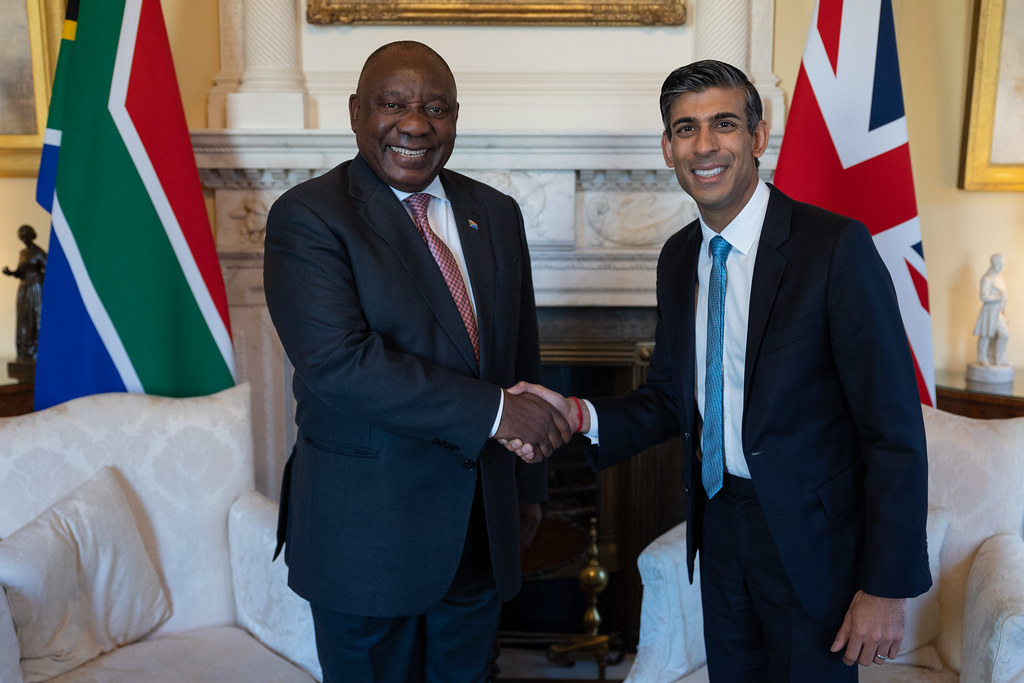The new agreement also includes new UK funding to bolster South Africa’s National Institute for Communicable Diseases and is supporting genomic sequencing to improve antimicrobial resistance surveillance on the African continent…reports Asian Lite News
British and South African researchers will save lives in the UK, South Africa and beyond. Institutions from across the UK and South Africa will undertake research into vital issues from health systems and financing to mental health and surgery.
The projects formed part of a new agreement to enhance the UK-South Africa health partnership, signed by the South African Health Minister and UK Health Secretary today at the Francis Crick Institute in London, during the President of South Africa’s State Visit.
The new agreement also includes new UK funding to bolster South Africa’s National Institute for Communicable Diseases and is supporting genomic sequencing to improve antimicrobial resistance surveillance on the African continent.
With UK support, more than 17,000 genomes have been sequenced to date in South Africa. The new support will enable detection of dangerous diseases faster across at least 18 African countries, building resilience into our health systems and protecting the world against future pandemics.
The partnership will prioritise building vaccine manufacturing in Africa so that vaccines can be developed and reach those who need them faster, including the most vulnerable. This in turn will mean the world will be better prepared for future pandemics.
The UK and South Africa are also working together to protect global health systems from the increasing threat of climate change.
UK Foreign Secretary James Cleverly said, “It is vital for countries across the world to work together to tackle global challenges like climate change and pandemic preparedness. This will benefit us all. The UK and South Africa have shown global leadership in joining together to protect people by preventing the spread of dangerous diseases, and by working to halt climate change – including through the ground-breaking Just Energy Transition Partnership, to help countries move away from using fossil fuels.”
Health and Social Care Secretary Steve Barclay said, “Strengthening the partnership between the UK and South Africa is not only crucial in improving health and patient outcomes in both countries but it is also vital to add to the global resilience of our health systems. Through this partnership we will reinforce our shared commitment to ensuring the world is better prepared for future pandemics through joint research and building capability for disease surveillance including antimicrobial resistance. It was excellent to meet President Ramaphosa at the Francis Crick Institute, where staff showcased the best of innovative research technology the UK has to offer. I look forward to building on this important relationship with South Africa in the months ahead, to drive more effective global health systems, promote clinical and regulatory excellence and above all protect patient safety.”
UK Secretary of State for the Department for Environment, Food & Rural Affairs (DEFRA), Thérèse Coffey, and His Royal Highness the Earl of Wessex also accompanied President Ramaphosa to Kew’s Royal Botanical Gardens, where a partnership with South African institutions is helping to preserve biodiversity and address climate change.
A long-term partnership between Kew and South Africa National Biodiversity Institute (SANBI), a key player in South Africa’s sustainable development, is ensuring the long-term survival of South Africa’s exceptionally rich plant diversity. The President and the Minister were able to see the flourishing fauna, such as the King Protea and heard from Kew’s experts on biodiversity.
UK Secretary of State for the Environment Thérèse Coffey said, “This visit highlights the fantastic biodiversity of South Africa and our longstanding scientific collaboration to protect nature. Both countries are working together to tackle the twin challenges of climate change and biodiversity loss. At the upcoming UN Convention on Biological Diversity meeting in Montreal, we will work together to accelerate global efforts to end species extinction, increase protections and support a sustainable future for our planet.”
Recognising South Africa’s status as one of the world’s most nature diverse countries, Ministers discussed the importance of the upcoming negotiations for a post-2020 global biodiversity framework at the UN Convention on Biological Diversity meeting in Montreal. The negotiations are an opportunity for the globe to agree a Paris moment for nature, to halt and reverse biodiversity loss by 2030 and to significantly increase the mobilisation of resources to tackle nature loss.
The Department of Health and Social Care (DHSC), through the National Institute of Health Research (NIHR), has supported 9 research projects led by South African and UK institutions, from 1 August 2022 onwards. These projects focus on a diverse range of themes (health systems, non-communicable diseases including mental health, as well as surgery, palliative care, and HIV), UK funding has been provided to 6 distinct South African research institutions across five cities (Cape Town, Durban, Pretoria, Stellenbosch, and Johannesburg).
To date the UK’s Fleming Fund has invested in the partnership with the National Institute of Communicable Diseases in South Africa to support Whole Genome Sequencing for antimicrobial resistance surveillance across Africa, which has provided state-of-the art lab equipment, training and analytical support.
ALSO READ-47% of UK voters like Sunak

Leave a Reply